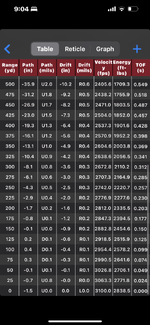Coopsdaddy
WKR
- Joined
- Nov 28, 2017
- Location
- Oklahoma
What yardage do you start dialing and what yardage do you consider long range (hunting).

 rokslide.com
rokslide.com
Not sure I understand. What are the inconsistencies?A year ago I had some inconsistencies in parallax settings at 20 degrees with my NXS scope.
If the majority of people I meet at the range is anything to compare, then they are missing because of lots of other simple things besides wind.Start dialing + 400 , LDH is 500+
wind is the X factor on LDH and imo is blame for a majority of mistakes and misses
.270 win 130 Norma or 140 game getter out of a m70 featherweight
Where do you hold for the (for me far more common, even hunting in open areas of the west) 100-ish yard shots? I know the pros/cons and can see a 200 yard zero if youre trying to avoid dialing, but a 275-300 zero seems like it would create more problems than it would solve—at least for me. I only have a 168gr 3006 load in my solver but that would put the vast majority of my hunting shots 3 to almost 4 mils (30-40 clicks or more than 1 foot at 100 yards) off from my zero. Are most of your shots that long? Or is this a hypothetical?If you are asking when it is worth the effort, figure out your point blank/dead hold range.
3006, 150 gr, 2900 fps, zeroed at 275 or 300 and i could hold on hair out to like 350/360 and slight holdover to 400 yds. After that i’d want help - hash marks or dialing.
Where do you hold for the (for me far more common, even hunting in open areas of the west) 100-ish yard shots? I know the pros/cons and can see a 200 yard zero if youre trying to avoid dialing, but a 275-300 zero seems like it would create more problems than it would solve—at least for me. I only have a 168gr 3006 load in my solver but that would put the vast majority of my hunting shots 3 to almost 4 mils (30-40 clicks or more than 1 foot at 100 yards) off from my zero. Are most of your shots that long? Or is this a hypothetical?
What makes sense to me as the fastest, most efficient and effective long range strategy is to zero at 300 yards. For most flat shooting rifles the hold on a deer sized animal is 1/3 up at 100 and 200, 3/4 up at 350, just over the back for 400 and half the chest depth over its back for 450.What yardage do you start dialing and what yardage do you consider long range (hunting).
